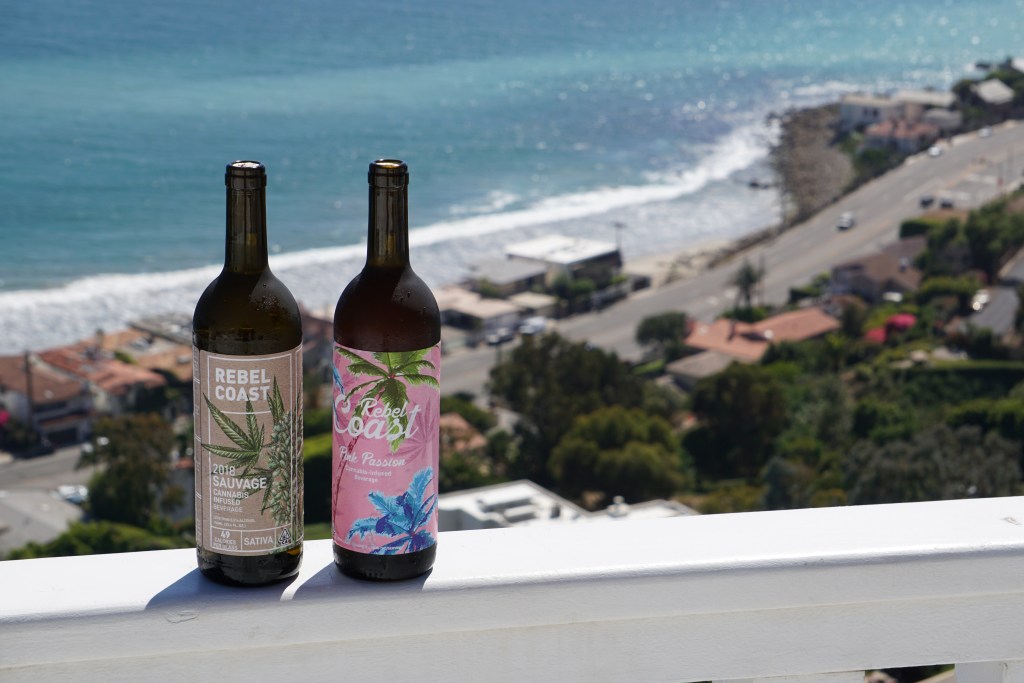There’s a long history of people putting weed in wine. You basically just add a bunch of heated cannabis flowers to fermenting wine, let it sit for five days, strain out the leaves, then allow the batch to age another 8 to 12 months. There’s a little more to it than that, but it’s pretty simple. And totally illegal.
In 2018, when California voters approved recreational marijuana, Rebel Coast Winery became the first in the world to produce weed-infused wine without running afoul of the law, which says you can’t combine booze and THC in the same bottle. The company has vineyards in Sonoma and offices in Los Angeles and partners with a cannabinoid tech company called ebbu to make its magic in the brave new world of marijuana drinkables. “Weed is big in California,” said CEO Josh Lizotte. “So is wine. We thought, let’s marry the two and see what happens.”
Rebel Coast’s batches of sauvignon blanc and rosé are stripped of alcohol then injected with THC, explained Lizotte, who’s been in the cannabis and finance sectors for a decade and also happens to hail from Santa Barbara. But the removal also takes out the wine’s terpenes (actually, all of its volatile compounds), so natural flavonoids are added back in for the proper mouthfeel and aroma.
It’s a tricky process, admitted Lizotte, with plenty of trial and error. “It’s hard to make non-alcoholic wine taste good,” he said. “It usually tastes like crap, actually.” Plus, wine terpenes are uniquely synergistic with THC; the interactions aren’t always predictable. Rebel Coast has the procedure dialed in but is still playing with recipes. The ultimate goal is to make an infused wine that tastes just like normal wine, without any lingering cannabis flavors, Lizotte said.
Rebel Coast’s two varietals are now sold in more than 100 stores across California. It’s also available online and just became offered through a statewide delivery service. The winery is about to release a champagne, Lizotte said, and is also developing a red. They’re not the only player in the weed-wine game, but they’re among the biggest and best.
I got the chance to try Rebel Coast’s rosé, called Pink Passion. The bottle, as it states on its label, contains 40 mg of THC from an indica strain, or 10 mg per glass. (The sauvignon blanc features a sativa strain.) Being a relative lightweight when it comes to cannabis and with a couple of bad edible experiences under my belt, I opted for half a glass. Better to start slow and build up, if desired. Five milligrams turned out to be the perfect amount. The taste, however, wasn’t great. It had a fruit-punch tang with a definite weedy finish. Lizotte seemed to appreciate the feedback. “We’re always trying to get better,” he said.
The high arrived in around 30 minutes and peaked at an hour. The steady, comfortable hum — noticeably less acute than the kind I get from smoking — lasted between two and two and a half hours. THC drinkables, unlike edibles, are absorbed in the stomach lining and bypass the liver, so the effects come and go more quickly. Some of my activities that enjoyable evening included gardening, watching a little of the Dark Crystal reboot, and preparing a larger-than-normal pasta dinner.
Rebel Coast says its goal is to provide a good, easy time without the alcohol hangover or the intense intoxication of a brownie. At $60 a bottle, it’s not the cheapest of options, but it’s well worth the money; a bottle goes a long way. On its site, the winery also says it wants to get you “giggly and naked with someone.” Let’s just say, mission accomplished. I’ll leave it at that.
For more information, see rebelcoast.com. Rebel Coast wines are available in Santa Barbara at Coastal Dispensary (1019 Chapala St., coastaldispensary.com).

